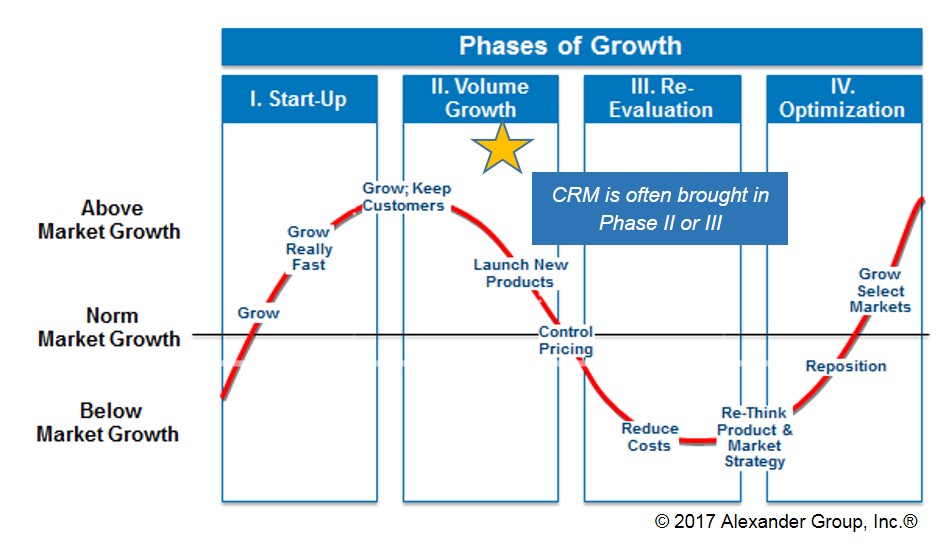Five Guiding Principles to Ensure Successful CRM Adoption

Customer Relationship Management (CRM) is a top enablement resource for world-class media sales organizations. Laying the foundation is critical, but successful adoption depends on honing the design, implementation and maintenance phases of CRM. Below are five guiding principles that, if followed, can help ensure sales organizations improve CRM adoption and place users at the center of focus.
1. Establish strategic goals for every stage of CRM evolution; know when to pass from one stage to another
Virtually all CRMs will go through a “crawl, walk and run” stage. For example, establishing a CRM might be the first step in a customer retention strategy; a later stage in CRM development may focus on solution selling at strategic customers.
Figure I: Phases of Growth & CRM Entry First-time CRM implementation centers on building CRM “muscle memory.” Sales and sales support teams may not have experience uploading sales collateral into a centralized system.
First-time CRM implementation centers on building CRM “muscle memory.” Sales and sales support teams may not have experience uploading sales collateral into a centralized system.
2. Planning and requirements collection must be thorough and include all key stakeholders
A CRM design requires a task force that includes all key stakeholders. Primary stakeholders could include sales leadership, front line sales and sales support. Secondary stakeholders may also include finance, IT and marketing. This group will be the primary decision-makers for:
- Contact Management (e.g., Agency vs. Direct Advertiser)
- Lead Management
- Account/Opportunity Management (e.g., Programmatic vs. Campaign)
- Sales Process Alignment–Access, Persuade & Fulfill
- Products and Pricing (e.g., Digital vs. Print)
- Team Management & Collaboration
- Reports & Dashboards
- Pipeline Management & Forecasting
It is important to prioritize requirements based on needs. Plan the CRM project completely; it will be much harder (and costly) for an integration partner to revert and re-engineer a solution.
3. Focus the architecture and build of the CRM on user-friendliness
If the functionality or process is difficult to execute, then system adoption is at risk. During architecting, building and testing, it is imperative to select a requisite number of users that can provide actionable feedback on functionality. Generally, the more intricate the function or workflow, the more feedback is required during testing. For example, a misstep that media companies can make during design is not considering the necessary collaboration between sales teams, content support, ad ops and campaign support.
4. Data integration needs to be carefully planned and well-scoped
CRM implementation is an opportunity to clean and audit existing data environments in order to maintain the integrity of data brought into the system. Example questions to ask about your data environment include:
- What are my current sources of data?
- What is the reliability of the data within each source?
- Are there data redundancies?
- Will we use the CRM system to validate sales compensation decisions?
Take caution to balance priority and desire when shifting from “crawl” to “run.” The “crawl” stage relies on baseline data inputted in the system before launch. Future stages, such as “run,” may focus more on multi-directional automation between multiple sources of data.
5. Adoption is not a static event; it requires a dedicated team, detailed work plan and user advocacy/support
While CRM launch may be a one-time event, the adoption and advocacy of the system is more like a campaign. Just like the design team, media companies need a well-equipped change adoption/advocacy group to support new users. This team will differ in structure because it will be comprised of “super users” enabled by leadership sponsorship.
The support structure does not end with an advocacy team, however. A CRM administrative support structure is equally important. These roles should have a deep understanding of the CRM solution, design and capabilities. Typically, these roles do not exist in a sales organization for companies who are implementing a CRM solution for the first time. Often media companies bring in external talent to fill these roles as it is not easy to train individuals for this skillset.
An investment in CRM is a natural progression for most media sales organizations that enter different phases of growth, rationalizing and maintaining their changing customer base. If used properly, CRM can help you stay in front of your rapidly changing environment to maximize customer ROI.

Speak With Our Experts
Alexander Group can help you navigate the murky waters of CRM adoption. Contact a media sales leader today.
